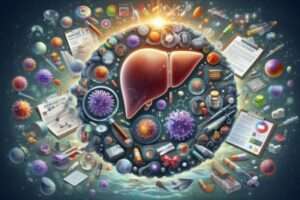Table of Contents
ToggleUnderstanding Hepatitis B Non-Responders: Causes, Implications and Alternative Strategies
Hepatitis B vaccination is a crucial tool in preventing the spread of this potentially life-threatening liver infection. However, not everyone who receives the vaccine develops adequate immunity. These individuals are known as hepatitis B non-responders.
In this comprehensive guide, we’ll explore what it means to be a non-responder, why it happens, and what options are available for those who don’t develop immunity after standard vaccination.
HPV Vaccine and Oral HPV: Understanding the Connection and Protection

What Is a Hepatitis B Non-Responder?
A hepatitis B non-responder is someone who doesn’t develop protective antibodies after completing the standard hepatitis B vaccination series. Typically, a person is considered immune to hepatitis B if they have an anti-HBs (hepatitis B surface antibody) level of 10 mIU/mL or higher after vaccination. Non-responders have levels below this threshold, leaving them potentially vulnerable to hepatitis B infection.
Genital Warts: Duration, Treatment, and Prevention – A Comprehensive Guide

Prevalence of Non-Responders
While the hepatitis B vaccine is highly effective for most people, a small percentage don’t respond as expected. According to the Centers for Disease Control and Prevention (CDC), about 5-15% of people don’t develop protective antibodies after completing the standard three-dose series. This percentage can vary based on factors we’ll explore in the next section.
Factors Affecting Vaccine Response
Several factors can influence whether someone responds to the hepatitis B vaccine:
1. Age: Older adults tend to have lower response rates compared to younger individuals. This is partly due to the natural decline in immune function as we age.
2. Genetics: Some genetic factors can affect how well a person’s immune system responds to the vaccine.
3. Obesity: People with a high body mass index (BMI) may have a reduced immune response to the vaccine.
4. Smoking: Cigarette smoking has been associated with lower antibody levels after vaccination.
5. Chronic health conditions: Certain conditions, such as diabetes, kidney disease, or HIV, can impair the immune response to vaccines.
6. Immunosuppression: People taking immunosuppressive medications or those with compromised immune systems may not respond adequately to the vaccine.
HPV in Guys: What Every Man Needs to Know
7. Vaccine administration: Improper storage or administration of the vaccine can affect its effectiveness.
Identifying Non-Responders
To determine if someone has developed immunity after hepatitis B vaccination, healthcare providers typically perform a blood test 1-2 months after the final dose of the vaccine series. This test measures the level of anti-HBs antibodies in the blood. If the level is below 10 mIU/mL, the person is considered a non-responder.
HPV in Men: A Comprehensive Guide to Understanding, Prevention and Treatment
Strategies for Non-Responders
If you’re identified as a hepatitis B non-responder, don’t worry – there are several strategies your healthcare provider might recommend:
1. Revaccination
The first approach is usually to administer another complete series of the hepatitis B vaccine. This can be done using either:
– Standard dosing: Three doses given over 6 months
– Accelerated schedule: Four doses given over 12 months
Revaccination can be successful in up to 50-60% of non-responders, according to a study published in the World Journal of Gastroenterology.
HPV Dormancy: Understanding the Silent Phase of the Human Papillomavirus
2. High-Dose Vaccine Series
Some non-responders may benefit from a high-dose vaccine series. This involves using a higher concentration of the hepatitis B surface antigen to stimulate a stronger immune response. Research has shown that this approach can be effective for some individuals who didn’t respond to the standard vaccine series.
3. Intradermal Vaccination
Another alternative is intradermal vaccination, where the vaccine is injected into the skin rather than the muscle. This method can sometimes trigger a better immune response in non-responders.
Natural Treatments for HPV: A Comprehensive Guide to Complementary Therapies
4. Combination Vaccine Approach
In some cases, using a combination vaccine that includes both hepatitis A and B antigens (such as Twinrix) might elicit a better response in non-responders.
5. Alternative Vaccine Formulations
Newer hepatitis B vaccines, such as those containing novel adjuvants or produced using recombinant DNA technology, may be more effective for some non-responders. Your healthcare provider can discuss whether these options are suitable for you.
Genital Skin Tags vs. Warts: Understanding the Difference and Treatment Options

Monitoring and Prevention for Non-Responders
If you remain a non-responder after trying alternative vaccination strategies, it’s crucial to take extra precautions to prevent hepatitis B infection:
1. Regular Testing: Get tested for hepatitis B infection periodically, especially if you have known exposure risks.
Granuloma Inguinale: A Comprehensive Guide to the Rare STI
2. Post-Exposure Prophylaxis: If you’re exposed to hepatitis B, you may need hepatitis B immune globulin (HBIG) and additional vaccine doses to prevent infection.
3. Safe Practices: Be vigilant about avoiding potential sources of hepatitis B exposure, such as practicing safe sex and not sharing personal items that could come into contact with blood.
Mycoplasma Genitalium: The Silent STI You Need to Know About!
4. Educate Others: If you’re a healthcare worker or in another high-risk profession, make sure your colleagues and employers are aware of your non-responder status.
5. Consider Alternative Career Paths: In some cases, persistent non-responders in high-risk professions may need to consider roles with lower exposure risk.

Importance of Vaccination Despite Non-Responder Status
Even if you’re identified as a non-responder, it’s important to complete any recommended revaccination series. Some people may develop a low-level immunity that isn’t detectable by standard tests but still offers some protection against severe hepatitis B infection.
Conclusion
Being a hepatitis B non-responder can be concerning, but it’s a manageable situation. With alternative vaccination strategies and careful prevention measures, non-responders can significantly reduce their risk of hepatitis B infection.
If you’re worried about your vaccine response, don’t hesitate to discuss your concerns with your healthcare provider. They can guide you through testing, revaccination options, and preventive strategies tailored to your individual needs.
Remember, while being a non-responder presents challenges, it doesn’t mean you’re destined to contract hepatitis B. Stay informed, take proactive steps, and work closely with your healthcare team to protect your health.
Reference to External Sources:
1. Centers for Disease Control and Prevention (CDC) – Hepatitis B Vaccination:
2. World Health Organization (WHO) – Hepatitis B Fact Sheet:
3. National Institute of Diabetes and Digestive and Kidney Diseases (NIDDK) – Hepatitis B:
4. Immunization Action Coalition – Hepatitis B FAQs:
5. World Journal of Gastroenterology – Management of non-responders to hepatitis B vaccine:


